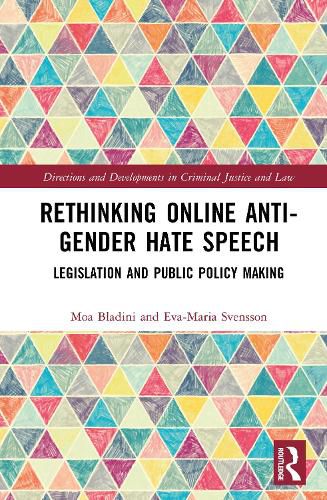Readings Newsletter
Become a Readings Member to make your shopping experience even easier.
Sign in or sign up for free!
You’re not far away from qualifying for FREE standard shipping within Australia
You’ve qualified for FREE standard shipping within Australia
The cart is loading…






Providing an innovative approach to understanding and addressing anti-gender hate speech, this book focuses on its effects on everyday life, how it is handled within legal frameworks, and how it challenges democratic principles.
Unlike previous research, which is often limited to currently regulated forms of hate speech, this book is focused on gender-based hate speech, demonstrating its broader social and ideological impacts. By contextualising freedom of expression within democratic values, it offers a new framework for addressing anti-gender hate speech as a threat to both individual dignity and societal diversity. Through this lens, the authors highlight how anti-gender hate speech represents not only a breach of individual rights but also a structural challenge to democracy, requiring responses that reflect these dual dimensions. The book provides a unique contribution to both legal scholarship and democratic theory by rethinking the balance between gender equality and freedom of expression as cooperative as well as inherently contextual and inclusive.
Rethinking Online Anti-Gender Hate Speech will be of great interest to students and scholars of Criminology, Law, Media and Communication, Sociology, and Women's and Gender Studies.
$9.00 standard shipping within Australia
FREE standard shipping within Australia for orders over $100.00
Express & International shipping calculated at checkout
Providing an innovative approach to understanding and addressing anti-gender hate speech, this book focuses on its effects on everyday life, how it is handled within legal frameworks, and how it challenges democratic principles.
Unlike previous research, which is often limited to currently regulated forms of hate speech, this book is focused on gender-based hate speech, demonstrating its broader social and ideological impacts. By contextualising freedom of expression within democratic values, it offers a new framework for addressing anti-gender hate speech as a threat to both individual dignity and societal diversity. Through this lens, the authors highlight how anti-gender hate speech represents not only a breach of individual rights but also a structural challenge to democracy, requiring responses that reflect these dual dimensions. The book provides a unique contribution to both legal scholarship and democratic theory by rethinking the balance between gender equality and freedom of expression as cooperative as well as inherently contextual and inclusive.
Rethinking Online Anti-Gender Hate Speech will be of great interest to students and scholars of Criminology, Law, Media and Communication, Sociology, and Women's and Gender Studies.